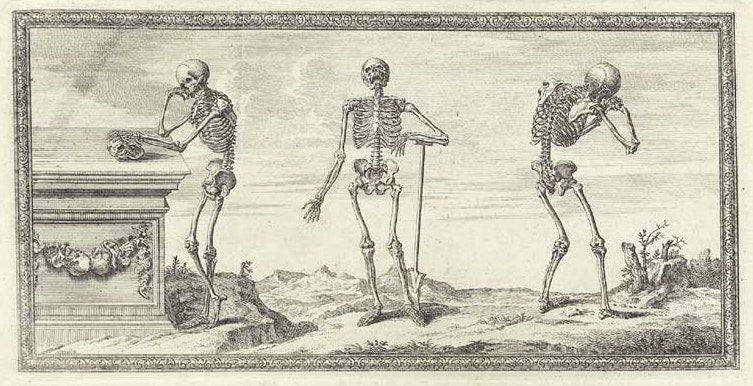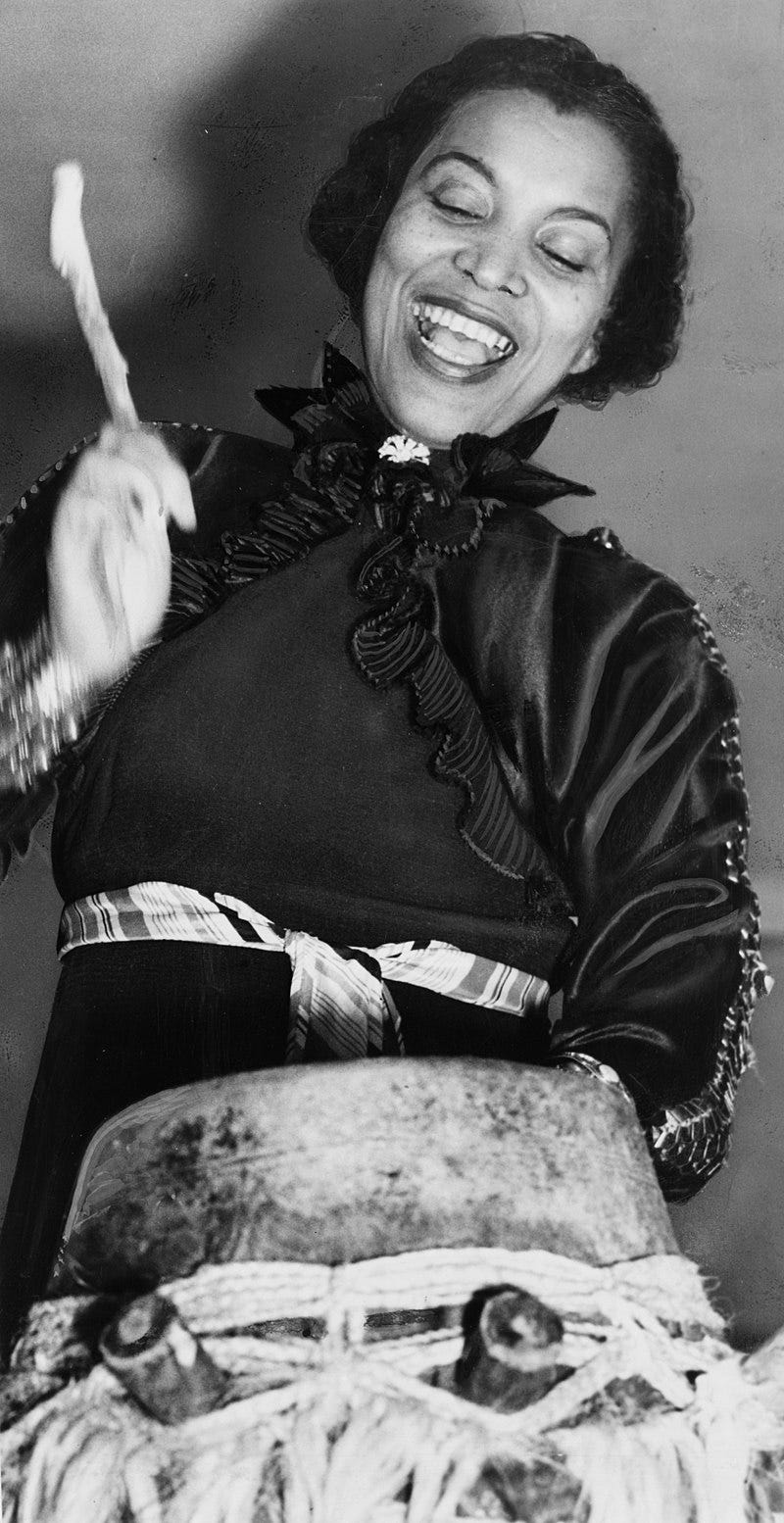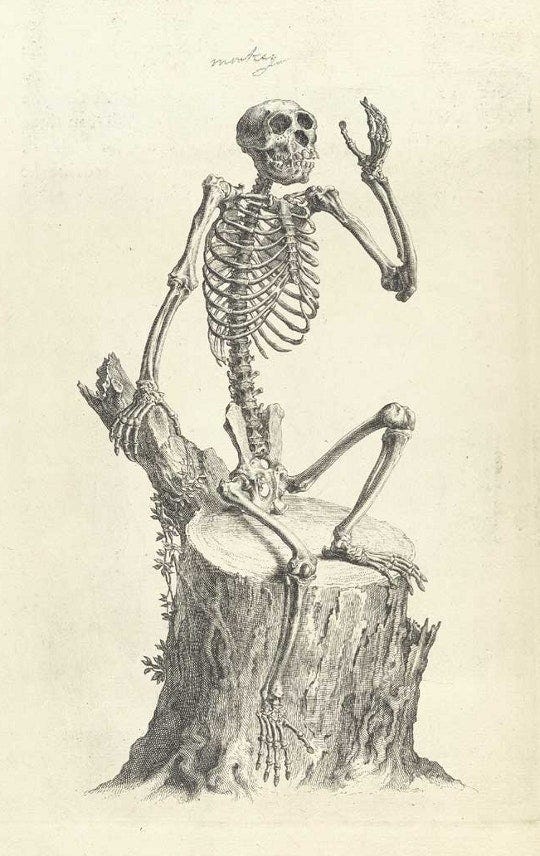A chilling, undead tale from African-American folklore
The accomplished novelist Zora Neale Hurston also trailblazed a career in anthropology that sought to recover the history of African-Americans through oral culture, as in the brief folktale below
Zora Neale Hurston, “High Walker and Bloody Bones”
This was a man. His name was High Walker. He walked into a boneyard with skull-heads and other bones. So he would call them: “Rise up, bloody bones and shake yo’self."
And they would rise up and come together and shake their selves and part and lay back down. Then he would say to hisself: “High Walker” and de bones would say: “Be walkin.”
When he’d get off a little way he’d look back over his shoulder and shake hisself, say: “High Walker and bloody bones.” And de bones would shake their selves. He knowed he had power.

What we love about this passage…
Even in its brevity, the tale has a distinct, clear voice. This is in part because it was recounted orally to Hurston, who was undertaking fieldwork and personally interviewing Black Southerners (such as the teller of this tale, AD Frazier). These collected stories were to be Hurston’s contribution to contemporary understandings of African-American culture, particularly under the banner of Franz Boas’s new school of anthropology spearheaded by practitioners who believed that all cultures were complex, dignified, equal, and with rich histories.
We love how visually arresting the details of this story are, the tale’s easy ability to evoke a memorable character, and, well, its spookiness. Like the fables of Aesop, on the surface, it seems, at first, almost easy to decode some everyday meaning. But the longer one sits with it, the more fantastical, supernatural, and imaginative it becomes, even showing a sense of humor in the relationship between the man and his bones.
About the Author…
Zora Neale Hurston (1891-1960) lived most of her young life in Eatonville, Florida, an all-black municipality founded in 1887, before pursuing her studies at Howard University and, eventually, Barnard College, Columbia University. In New York, her fiction and playwriting helped her become a beacon of the Harlem Renaissance, even as she developed sometimes turbulent relationships with some of its leading figures such as Langston Hughes.
She also became a committed anthropologist under the occasional mentorship of the then-leading scholar Franz Boas. In this field, she staked a claim that the oral folktales of African-Americans in the American South (as well as those of the people of Haiti) were significant historical developments and should be collected — and, importantly, rendered as closely as possible to their original speech. She published some of these records in Mules and Men (1935), as well as drew on them for what is now considered her masterpiece, the novel Their Eyes Were Watching God (1937).
To Read Alongside…
The more we think about Hurston, the more we want to spend a day revisiting our favorite works of hers. In addition to the ones mentioned above, we also recommend her short stories, such as “Sweat” (1926); or the incredible homage to Hurston written by Alice Walker and featured in her anthology In Search of Our Mothers’ Gardens (1983). You also might be interested in reading past LitHits Newsletters featuring other figures from the Harlem Renaissance: see, for example, Langston Hughes’s poem “Theme for English B” or an excerpt from Jean Toomer’s modernist work Cane.
“High Walker” also reminds us of some of our favorite American ghost stories which dabble in the otherwordly, undead, and supernatural — like Edgar Allan Poe’s “The Tell-Tale Heart” (1843) or Washington Irving’s “The Legend of Sleepy Hollow” (1820), which has become part of American folklore more broadly.
Suggest a LitHit!
Tell us your own favourites from literature you've read, and we can feature you as a Guest Curator if you like. Just email us with the following information:
Your full name
The title of the book you're suggesting
The location of the excerpt within the book (e.g., "in the middle of chapter 5"), or the excerpt itself copied into the email or attached to it (in Word)
Why you love it, in just a few sentences
About LitHits
LitHits helps you make time for reading by bringing you unabridged excerpts from brilliant literature that you can read on the go, anytime or any place. Our curators carefully select and frame each excerpt so that you can dive right in. We are more than a book recommendation site: we connect you with a powerful, enduring piece of literature, served directly to your mobile phone, tablet or computer.
Today's guest curator...
Dr Daniel Abdalla is a core member of LitHits and an expert in nineteenth and twentieth-century literature, particularly its relationship to science.
You might also enjoy...
Feedback
We'd love to hear your thoughts on our newsletter:
kshepherdb@yahoo.co.uk
Graphic design by Sara Azmy
All curation content © 2023 LitHits. All rights reserved.





